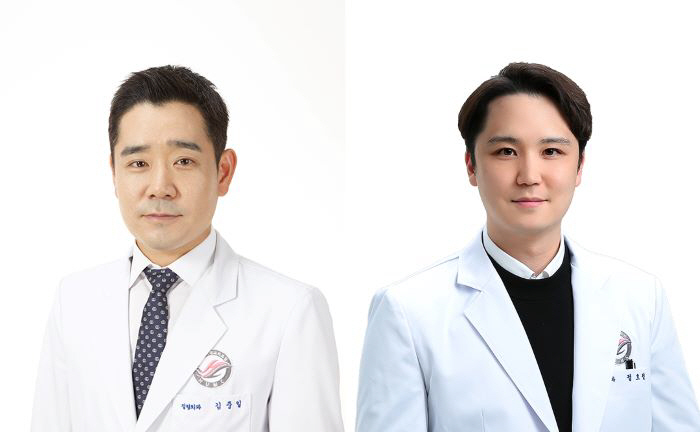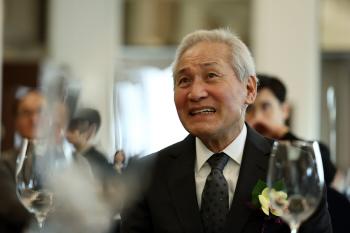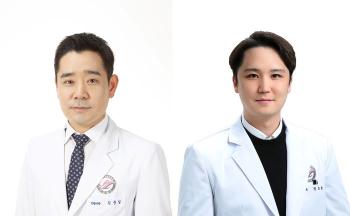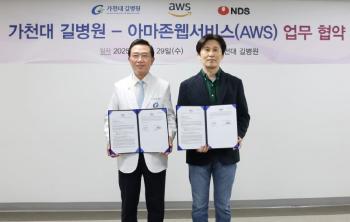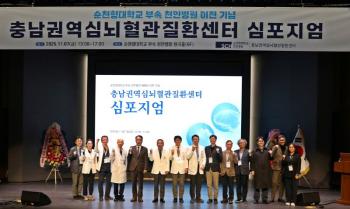Professor Kim Joong-il and Jeong Ho-jung of Hallym University's Gangnam Sacred Heart Hospital, Outstanding Director of the Asia-Pacific orthopedic surgery computer surgery society
Nov 07, 2025
A research team led by Kim Joong-il and Jung Ho-jung of orthopedics at Hallym University Gangnam Sacred Heart Hospital (Hospital Director Lee Dong-jin) won the Excellence Award at the Asia-Pacific Orthopedic Computer Surgery Society (CAOS Asia-Pacific 2025).
The award study is a paper titled 'A Novel Modified Tibial Knee Center Improves the Accuracy of Posterior Tibial Slope in CT-Based Robotic-Arm Assisted Total Knee Arthroplasty)' that improves the surgical accuracy of the tibia posterior tilt angle by newly modifying the tibia center point in knee robotic artificial joint replacement based on CT images.
In knee artificial joint surgery, 'tibial posterior tilt angle' is a very important factor. If this angle is not accurately reproduced, the knee may not naturally bend, or postoperative pain and stiffness may occur. In addition, discomfort may appear when walking on flat land or stairs.
The research team proposed a newly defined 'Modified Tibial Knee Center (MTKC)' in knee robot artificial joint replacement surgery.
In conventional surgical methods, the reference point that centers the knee does not fully match the anatomical axis of the actual bone, so 'rear tilt angle', which is the tilt of the tibia (shinbone), has been calculated incorrectly. This also resulted in a slight error between the planned cutting angle and the actual surgical outcome.
To improve this, the research team devised a new reference point called 'Modified Tibial Knee Center'. Applying this method increases the precision and predictability of surgery by allowing the robot to more accurately adjust the angle when cutting bones.
Professor Ho-jung Jeong "The tibia center point used in the existing artificial joint surgery overestimated the tibia posterior tilt angle of the patient, and there was a limit to the decrease in the tilt angle after the actual surgery.""To solve this problem, a new central point has been derived through various simulations and clinical verifications.", he explained.
Professor Kim Joong-il said, "This study is significant in that it goes beyond simply improving the accuracy of surgery, and provides a reference point to quantitatively analyze the discrepancy between the planned value of robotic surgery and the actual results and correct it." We will continue our research to refine customized artificial joint surgery based on anatomical characteristics of each patient in the future."."
Professor Kim Joong-il established the Hallym Robot Artificial Joint Education Center for the first time in Korea in 2021 and is running robot artificial joint surgery training for orthopedic surgeons at home and abroad. Based on abundant clinical experience and research results, it is recognized as a specialized educational institution in domestic and foreign academia.
Meanwhile, the Computer Assisted Orthopedic Surgery Asia-Pacific (CAOS Asia-Pacific) is an international academic circuit that shares the latest research results that incorporate computer and robot technologies into orthopedic surgery, and orthopedic and medical experts from all over the world participate to discuss the direction of the development of precision digital surgical technology.
The award study is a paper titled 'A Novel Modified Tibial Knee Center Improves the Accuracy of Posterior Tibial Slope in CT-Based Robotic-Arm Assisted Total Knee Arthroplasty)' that improves the surgical accuracy of the tibia posterior tilt angle by newly modifying the tibia center point in knee robotic artificial joint replacement based on CT images.
In knee artificial joint surgery, 'tibial posterior tilt angle' is a very important factor. If this angle is not accurately reproduced, the knee may not naturally bend, or postoperative pain and stiffness may occur. In addition, discomfort may appear when walking on flat land or stairs.
The research team proposed a newly defined 'Modified Tibial Knee Center (MTKC)' in knee robot artificial joint replacement surgery.
In conventional surgical methods, the reference point that centers the knee does not fully match the anatomical axis of the actual bone, so 'rear tilt angle', which is the tilt of the tibia (shinbone), has been calculated incorrectly. This also resulted in a slight error between the planned cutting angle and the actual surgical outcome.
To improve this, the research team devised a new reference point called 'Modified Tibial Knee Center'. Applying this method increases the precision and predictability of surgery by allowing the robot to more accurately adjust the angle when cutting bones.
Professor Ho-jung Jeong "The tibia center point used in the existing artificial joint surgery overestimated the tibia posterior tilt angle of the patient, and there was a limit to the decrease in the tilt angle after the actual surgery.""To solve this problem, a new central point has been derived through various simulations and clinical verifications.", he explained.
Professor Kim Joong-il said, "This study is significant in that it goes beyond simply improving the accuracy of surgery, and provides a reference point to quantitatively analyze the discrepancy between the planned value of robotic surgery and the actual results and correct it." We will continue our research to refine customized artificial joint surgery based on anatomical characteristics of each patient in the future."."
Professor Kim Joong-il established the Hallym Robot Artificial Joint Education Center for the first time in Korea in 2021 and is running robot artificial joint surgery training for orthopedic surgeons at home and abroad. Based on abundant clinical experience and research results, it is recognized as a specialized educational institution in domestic and foreign academia.
Meanwhile, the Computer Assisted Orthopedic Surgery Asia-Pacific (CAOS Asia-Pacific) is an international academic circuit that shares the latest research results that incorporate computer and robot technologies into orthopedic surgery, and orthopedic and medical experts from all over the world participate to discuss the direction of the development of precision digital surgical technology.
|
This article was translated by Naver AI translator.
